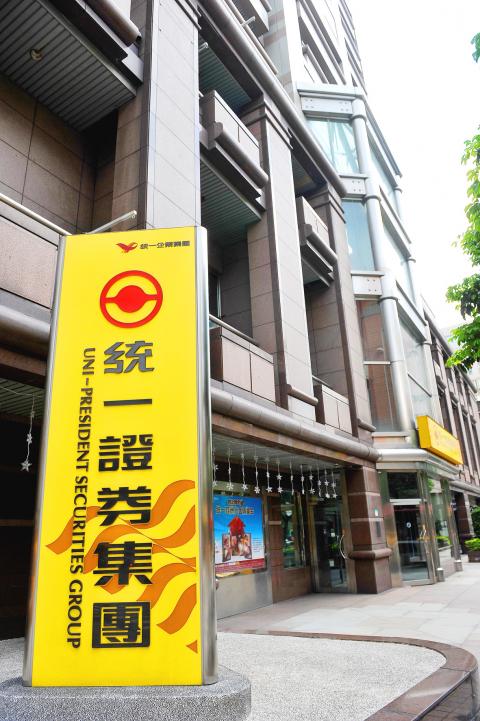President Securities Corp (統一證券) yesterday denied reports that human error at the company sparked volatility on Taipei’s stock futures market.
Shortly after yesterday’s opening bell at 8:45am, pricing on the futures market plummetted from 10,328 points to 10,274.
The decline triggered the company’s automated trading program to initiate stop-loss market orders designed to contain risk, President Securities said in a filing with the Taiwan Stock Exchange.

Photo: Chien Jung-fong, Taipei Times
After the orders were made, future contract prices continued falling to an intraday low of 9,408 points, the company said.
The incident created chaos, dragging down the local stock market, with the TAIEX closing down 49.39 points, or 0.47 percent, at 10,469.88.
At one point, the TAIEX fell below the the nearest technical resistance level of 10,500 points due to a slump at the opening of the futures market.
Losses from the incident incurred by President Securities totaled about NT$20.82 million (US$688,788), less severe than estimates of NT$60 million to NT$80 million made by market observers and media outlets, the company said.
The brokerage said that it had made 131 stop-loss orders, representing 17 percent of the turnover during the incident’s short time frame of minutes or seconds.
The brokerage said that the losses were incurred by its proprietary traders and that its customers were not affected.
However, the Financial Supervisory Commission (FSC) said it had begun an investigation into the sudden price declines and the circumstances that led to the triggering of President Securities’ stop-loss mechanism.
While there have been cases of “fat-finger errors,” the incident was thought to be the first of software risk containment measures going awry and causing substantial losses, Securities and Futures Bureau Deputy Director Chang Chen-shan (張振山) told a news conference in Taipei.
Fat-finger errors are named for the idea that people with large digits might more frequently cause data entry errors.
The Taiwan Futures Exchange did not detect errors or irregularities that could have caused the incident, Chang said, but did not provide further details because of the investigation.
“It is not unusual to see large price movements early in the session due to the smaller number of market orders,” he said, adding that the reasons for yesterday’s sudden fall are still largely unknown.
The intraday pricing chart showed that early in the session, pricing dipped sharply before quickly recovering in two successive cycles before relatively calm trading for the rest of the session, Chang said.
This means that President Securities’ stop-loss orders did not throw off other brokerages’ trading programs, as that could have led to a continued decline, he said.
Affected investors should ask their brokerages for advice, the commission said, adding that it would conduct additional checks of President Securities’ internal controls.

CALL FOR SUPPORT: President William Lai called on lawmakers across party lines to ensure the livelihood of Taiwanese and that national security is protected President William Lai (賴清德) yesterday called for bipartisan support for Taiwan’s investment in self-defense capabilities at the christening and launch of two coast guard vessels at CSBC Corp, Taiwan’s (台灣國際造船) shipyard in Kaohsiung. The Taipei (台北) is the fourth and final ship of the Chiayi-class offshore patrol vessels, and the Siraya (西拉雅) is the Coast Guard Administration’s (CGA) first-ever ocean patrol vessel, the government said. The Taipei is the fourth and final ship of the Chiayi-class offshore patrol vessels with a displacement of about 4,000 tonnes, Lai said. This ship class was ordered as a result of former president Tsai Ing-wen’s (蔡英文) 2018

‘SECRETS’: While saying China would not attack during his presidency, Donald Trump declined to say how Washington would respond if Beijing were to take military action US President Donald Trump said that China would not take military action against Taiwan while he is president, as the Chinese leaders “know the consequences.” Trump made the statement during an interview on CBS’ 60 Minutes program that aired on Sunday, a few days after his meeting with Chinese President Xi Jinping (習近平) in South Korea. “He [Xi] has openly said, and his people have openly said at meetings, ‘we would never do anything while President Trump is president,’ because they know the consequences,” Trump said in the interview. However, he repeatedly declined to say exactly how Washington would respond in

WARFARE: All sectors of society should recognize, unite, and collectively resist and condemn Beijing’s cross-border suppression, MAC Minister Chiu Chui-cheng said The number of Taiwanese detained because of legal affairs by Chinese authorities has tripled this year, as Beijing intensified its intimidation and division of Taiwanese by combining lawfare and cognitive warfare, the Mainland Affairs Council (MAC) said yesterday. MAC Minister Chiu Chui-cheng (邱垂正) made the statement in response to questions by Democratic Progressive Party (DPP) Legislator Puma Shen (沈柏洋) about the government’s response to counter Chinese public opinion warfare, lawfare and psychological warfare. Shen said he is also being investigated by China for promoting “Taiwanese independence.” He was referring to a report published on Tuesday last week by China’s state-run Xinhua news agency,

‘ADDITIONAL CONDITION’: Taiwan will work with like-minded countries to protect its right to participate in next year’s meeting, the foreign ministry said The US will “continue to press China for security arrangements and protocols that safeguard all participants when attending APEC meetings in China,” a US Department of State spokesperson said yesterday, after Beijing suggested that members must adhere to its “one China principle” to participate. “The United States insists on the full and equal participation of all APEC member economies — including Taiwan — consistent with APEC’s guidelines, rules and established practice, as affirmed by China in its offer to host in 2026,” the unnamed spokesperson said in response to media queries about China putting a “one China” principle condition on Taiwan’s